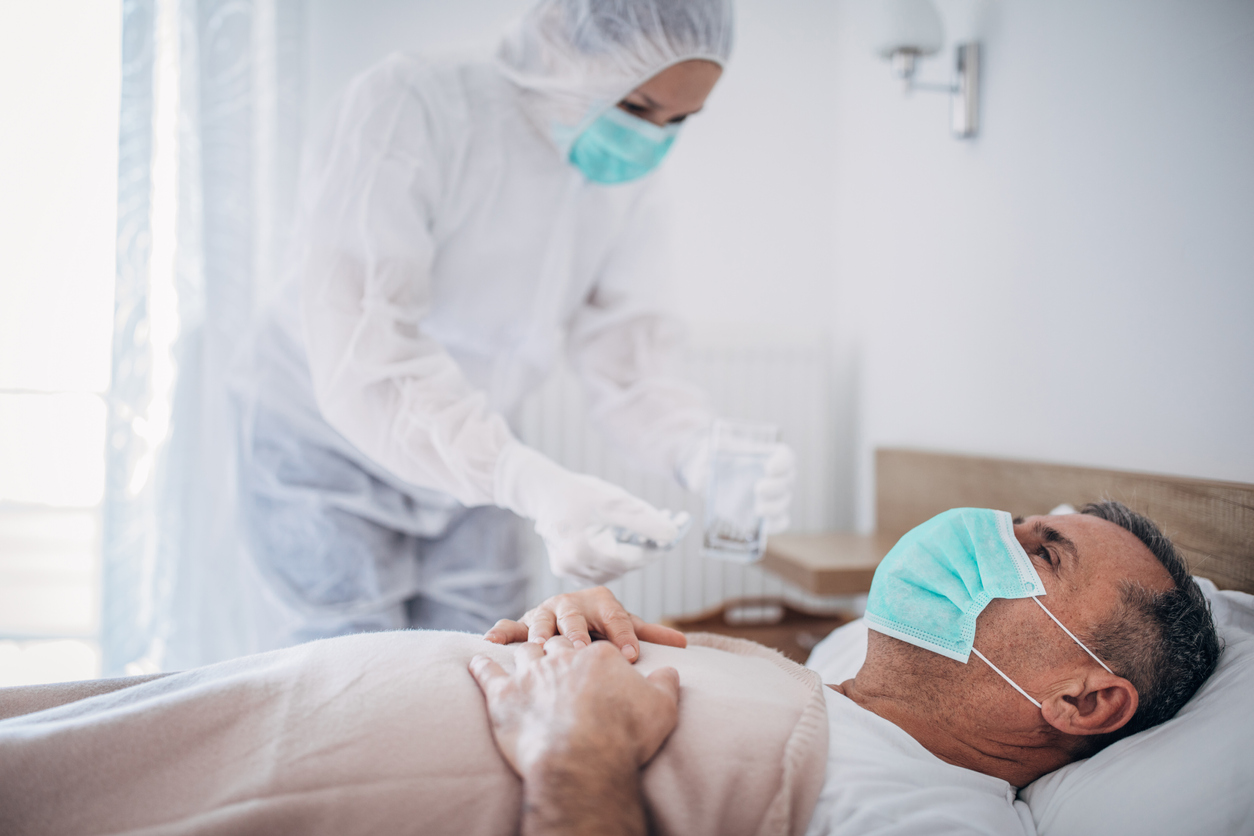
There are more than 428,000 cases of COVID-19 worldwide—a number that is growing so quickly, it will have changed by the time you read this. The United States alone has more than 55,000 cases, and the entire country is on edge for a lot of reasons. How can we stay safe? What will happen to the economy and our finances? What are the symptoms of coronavirus? And what does it feel like to have it?
With skyrocketing illness rates, more and more people are finding out exactly what it feels like to have COVID-19. Current patients and those who have recovered from it are sharing their stories, so we all have a better idea of what to expect if we get hit with this virus.
What Are the Coronavirus Symptoms?
Coronavirus symptoms are often described as flu-like, and they may be mild or severe. For the majority of people, symptoms are mild, and some people who are infected show no symptoms at all. The Centers for Disease Control and Prevention says the three most common symptoms are:
- Fever
- Dry Cough
- Shortness of Breath
These symptoms may arise 2-14 days after you’ve been exposed to the virus. Some people may also experience aches and pains, fatigue, or a sore throat. Recently, there have been reports of a loss of taste and smell associated with the coronavirus, as well.
It’s important to remember that many people recover from COVID-19 without medical intervention. The World Health Organization recommends that people with mild symptoms self-isolate, monitor their condition, and call their healthcare provider for advice on testing. People who have trouble breathing need to seek medical attention.
What Does It Feel Like to Have COVID-19?
The experience is a little different for everyone, depending upon the severity of the case. This is how some people have described it:
- 55-year-old said he felt intense pressure in his chest, like an elephant was standing on him.
- 25-year-old thought he would die because it was such a struggle to breathe; at one point during the illness, he wasn’t able to speak.
- 39-year-old said it was like “having glass in your lungs. It’s hard to explain, but every breath is a battle.”
- A man in his 50s said he was shivery with body aches, especially in his legs. He didn’t sleep well, but the symptoms did not progress beyond that. He did not experience the cough or the shortness of breath that tend to be common coronavirus symptoms.
- 60-year-old physician said it was “worse than childbirth.”
- 32-year-old said he felt generally sick with a terrible headache, but added that there was a psychological component, as well: he was unsettled by the idea that he might spread the virus to someone he loved.
- 42-year-old felt especially tired with muscle aches; he then developed a fever and dizziness. “I kept telling people I felt spongy,’ he recalls. ‘Like a kitchen sponge.“
- 64-year-old had a serious cough with foggy thinking and extreme fatigue that got worse after five days. He said, “This is not something anybody wants to go through.“
Where to Find Help During COVID-19

During this trying time, most of us need some help—whether it’s related to physical health, mental well-being, or finances. Here’s where you can find some assistance.
If You’re Sick
Call your healthcare provider. He or she will give you a recommendation based upon your symptoms. Since many hospitals are overwhelmed, calling first is preferable to an unannounced visit. In smaller areas that have not yet been hit hard by the virus, this also gives the facility the opportunity to prepare for your arrival in case you are infected, to help prevent the spread.
If You’re Trying to Stay Healthy and Informed
The Centers for Disease Control and Prevention and the World Health Organization offer thorough, reliable, updated, and unbiased information about the virus and its spread.
To protect yourself and avoid spreading the virus to others, it remains essential to self-isolate. Leave your home only when necessary, stay at least six feet away from other people, and wash your hands thoroughly and often. At this point, many cities and states are ordering their citizens to stay at home, allowing them to leave for medical appointments, groceries, outdoor exercise, and to take care of a loved one.
Harvard Health suggests supporting your immune system by getting enough sleep, eating healthy meals, avoiding smoking, limiting alcohol consumption, and exercising.
If You’re Feeling Anxious or Afraid
In addition to the general discomfort of stress and anxiety, it can weaken your immune system and lead to destructive or unhealthy behavior. The CDC says that those with pre-existing mental health conditions should continue treatment as normal and take note of worsening symptoms. The Substance Abuse and Mental Health Services Administration offers more information and resources, as does MentalHealth.gov.
For those feeling newly anxious or fearful in light of COVID-19, the CDC offers some tips for managing it:
- Take a break from the news.
- Stretch, exercise, meditate, get plenty of sleep, and eat well. Maintain healthy habits.
- Spend time doing activities you enjoy, or learn something new.
- Connect with others (virtually, of course!) and talk about your feelings.
- Research and understand the facts about COVID-19. Be careful about spreading false information—take the time to fact check before you share news, and make sure what you’re reading is from a reliable, unbiased source.
If You’ve Lost Your Job or Are Worried About Finances
Many people are in the same boat. The key is to assess your situation and take control of what you can. Around the country, various service providers have been extending deadlines and eliminating late fees. Call your providers and see what their policies are during this time. Read more about the three money moves you can make amid the COVID-19 pandemic to help you save money and maintain some control over what’s happening.
At CIS Home Loans, we’re committed to our employees and customers at this time. We’re insisting on safety measures in accordance with CDC guidelines, and many of our employees are working from home so we can continue to serve you. If you have any questions about your loan during the time of COVID-19, please contact us.
